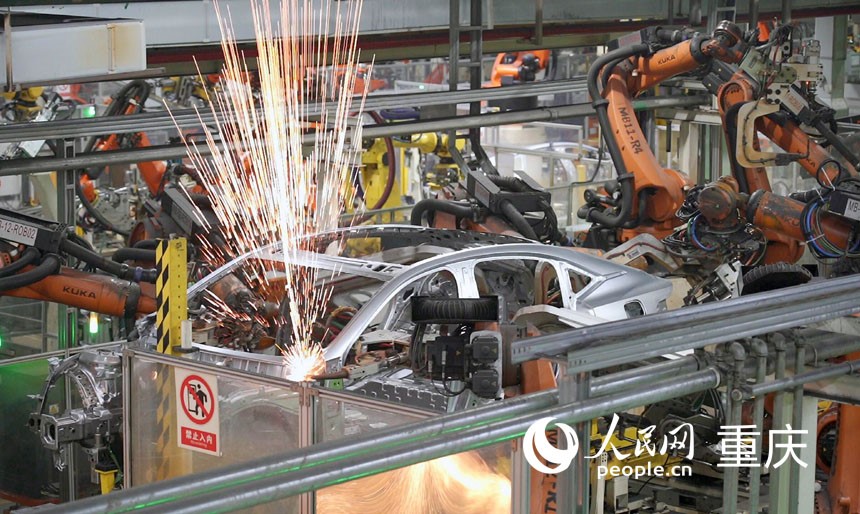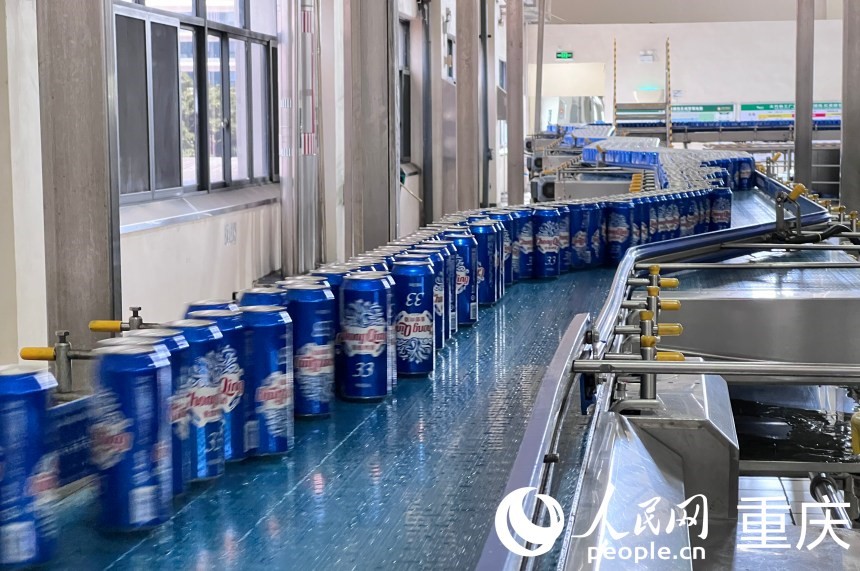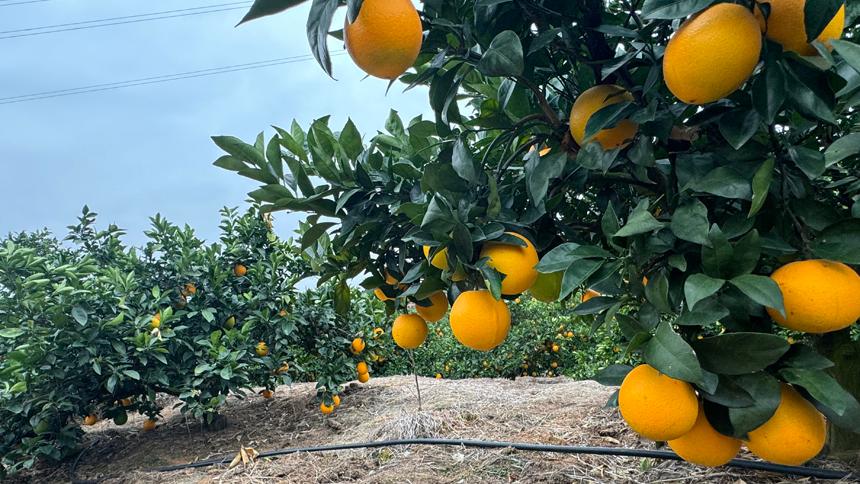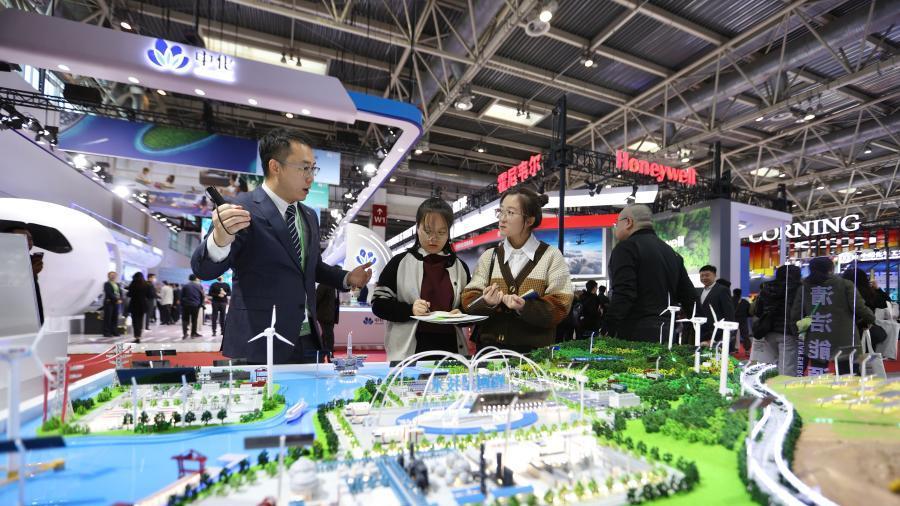SW China's Chongqing transforms into manufacturing, investment hotspot
With an extensive transportation network, a booming manufacturing industry and policies favorable to foreign investment, southwest China's Chongqing Municipality has transformed from China's inland "mountain city" into a key hub driving development in the country's inland regions.
Upgraded transportation network
At Tuanjie Village Central Station in Chongqing's International Logistics Hub Park, trucks and cranes buzz with activity as trains arrive and depart frequently.
This station is the starting point for China-Europe freight trains and the New International Land-Sea Trade Corridor, which connects global ports via rail, sea and road.
Goods from across China converge at Tuanjie village before heading worldwide, while international imports are distributed throughout the country from here.

Photo shows a freight train passing under a gantry crane at Chongqing International Logistics Hub Park in southwest China's Chongqing Municipality. (People's Daily Online/Liu Yi)
During the past 13 years, the Yuxinou (Chongqing-Xinjiang-Europe) railway, which was China's first Europe-bound freight route, saw the frequency of China-Europe freight train services grow from one trip a month to 10 trips per day. Additionally, its cargo has diversified from a single product to over 1,000 types of goods.
Jiang Tong, who drove the first Yuxinou train from Chongqing to Europe in 2011, has seen the railway network expand over his 13 years operating the route.
The Yuxinou railway had covered 110 cities in nearly 40 countries and regions as of May 2024.
Jiang's apprentice, Lyu Sixiang, has also seen major changes in Chongqing's transport network.
In 2017, Lyu became one of the first drivers on the "southbound corridor" when Chongqing launched regular freight trains on the New International Land-Sea Trade Corridor.
The rail-sea intermodal service on the New International Land-Sea Trade Corridor has cut shipping time from Chongqing to ASEAN countries from 32 to about 18 days.
As transportation volume has continued to grow, Lyu's team has expanded from 100 to over 300 drivers.
Jiang and Lyu operate trains on different routes, carrying exports west and south from Chongqing, and returning with imports to the city's International Logistics Hub Park.
As of May 2024, the park had operated 62 international rail routes serving 514 ports in 123 countries, according to Han Chao, deputy general manager of the park's operating company.
On April 30, China's State Council approved a comprehensive bonded zone at the park. This zone is expected to address the limitations of the park's original bonded logistics center and provide wide-ranging services for the city's export-oriented industries.
The new bonded zone aims to link global and domestic markets via cross-border railways, boosting Chongqing's open economy. This supports the city's goal to become a hub that facilitates the opening up of the country’s interior.
Modern manufacturing clusters
Chongqing has made continuous efforts to transform its transportation advantages into industrial advantages and has actively promoted the high-quality development of its manufacturing industry. The city is iteratively upgrading its industrial structure and cultivating new quality productive forces.
The city is focusing on three key industrial clusters: intelligent connected new energy vehicles (NEVs), next-gen electronic information manufacturing, and advanced materials.
Chongqing's auto industry is shifting from traditional fuel vehicles to electric, intelligent and digital models.
The municipality produced 997,000 vehicles from January to May 2024.
"Chongqing is the ideal city for automotive designers," said Klaus Zyciora, vice president of Chinese automaker Changan Automobile.

Photo shows robotic arms in a Changan Automobile factory in southwest China's Chongqing Municipality. (People's Daily Online/Liu Yi)
This renowned German automotive designer saw great potential in China's auto industry and decided to "switch teams" from Germany to China. Calling Chongqing "a place where anything can happen," he joined Changan Automobile in October 2023 to lead the company's global design efforts.
Panasonic Appliances Vacuum Insulation Devices (Chongqing) Co., Ltd., or PAPVDCQ, was Panasonic's first investment in western China. It has since become a key global research and manufacturing base for vacuum insulation panels.
"Our buildings were rentals when our factory was established in 2015. Now we have bought our own workshops. This is how we have rooted ourselves in Chongqing," said Gu Ruifei, general manager of PAPVDCQ.
Magnet for high-quality foreign investment
Chongqing's improved business climate has attracted numerous multinational companies.
Corning Inc., a global leader in materials science, established Corning Display Technologies (Chongqing) Co. in 2015, impressed by the city's investment environment.
The subsidiary expanded its factory in 2021. To date, Corning has invested over $1.5 billion in Chongqing.
"The government provides convenient services and policies for foreign companies, including tax incentives, policy guidance, guaranteed power supply, and support for innovation," said Daniel Tseng, president and general manager of Corning Display Technologies China.
Tseng credits Chongqing's business-friendly policies for Corning's expanding investment and improving supply chain in the city.

Paul Knutson (center), former Expansion Project Director, Display Technology at Corning, enjoys a hot pot with colleagues on Nanbin Road, southwest China's Chongqing Municipality.(People's Daily Online/Su Yingxiang)
"I came to China in 2018 and came to Chongqing in 2021. Now Chongqing is my home," said Paul Knutson, former Expansion Project Director, Display Technology at Corning.
Knutson, the American executive, who came to Chongqing for the factory's expansion, has integrated into local life, considering Chongqing his second home.
Carlsberg Group, a multinational brewer, ranks among the earliest Danish companies to invest in China and is one of Denmark's largest investors in the country.
To date, Carlsberg has invested more than 20 billion yuan ($2.81 billion) in China. The global brewery has acquired a 60 percent majority stake in Chongqing Brewery Co., Ltd. through multiple equity purchases.
In 2020, Carlsberg consolidated its Chinese beer assets under Chongqing Brewery, making it the company's sole operational platform in China.

Photo shows a ring-pull can production line at Chongqing Brewery’s packaging workshop in southwest China's Chongqing Municipality. (People's Daily Online/Hu Hong)
Xie Yi, vice president of Chongqing Brewery, said Chongqing is the foundation of Carlsberg's China business.
"Chongqing is a vibrant consumer center. Enjoying hot pot and drinking Chongqing beer is part of the city's lifestyle and an authentic experience," Xie said, noting its unique appeal for a beer company.
Photos
Related Stories
- German?designer?steers Changan Auto's global growth from China's Chongqing
- One-handed Kung Fu Master
- Chongqing's secret sauce to internet fame
- Asia-Europe trade on fast track as ASEAN Express accelerates from Chongqing
- High-quality homestays drive local tourism in Beibei District of Chongqing
- View of national nature reserve of Jinyun Mountain in Chongqing, SW China
- Aerial view of Ciqikou ancient town in Chongqing, SW China
- Crowd counts down Hongyadong lights in Chongqing
- Three-month-old panda cub makes public debut in Chongqing
- China's Chongqing seeks input from global entrepreneurs on opening-up, development
Copyright © 2024 People's Daily Online. All Rights Reserved.









